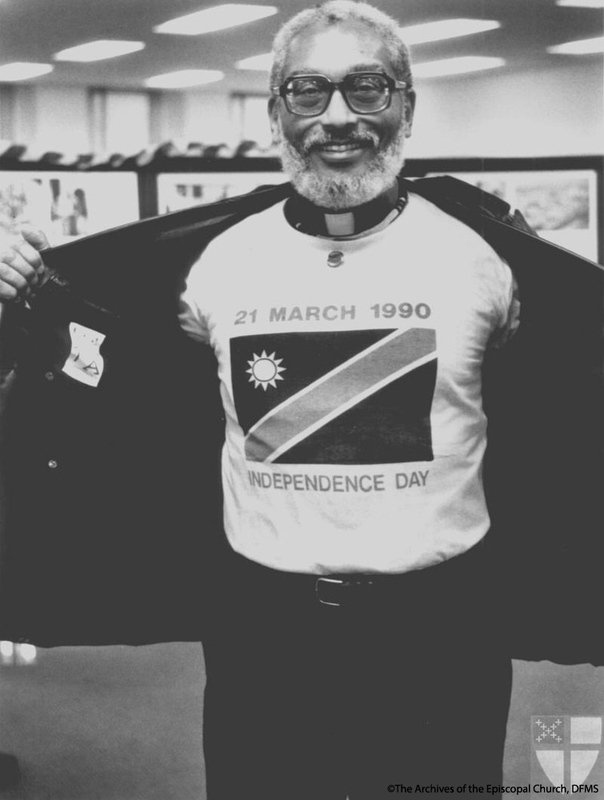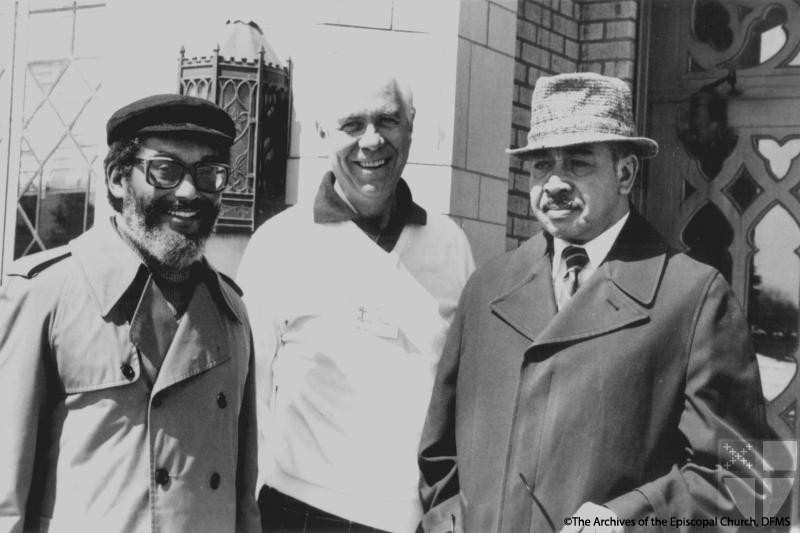Leadership Gallery
The Reverend Earl Albert Neil, 1935-2024
Earl A. Neil, priest and human rights activist, was born in Saint Paul, Minnesota to Katherine L. and Earl W. Neil in 1935. He graduated from Carleton College in 1957 and attended Seabury-Western Theological Seminary in Evanston, Illinois, where he completed his ministerial training in 1960. He was ordained in the Episcopal Church the same year.
The Rev. Earl Neil celebrating the independence of Namibia in 1990, a period in which he served as executive for Advocacy, Witness, and Justice at the Episcopal Church Center.
From his first assignment, Neil experienced the often subtle and sometimes blatant racial prejudice that would both constrain his opportunities for service and inspire him to work for change. Unable to receive an appointment in his home state, he accepted his first assignment in Wichita, Kansas, at the mission congregation of St. Augustine’s, an all-Black parish. After losing diocesan sponsorship, the church was closed down. An inability to integrate the parishioners into other Episcopal parishes in Wichita resulted in the migration of 98% of the parish to other denominations. The loss of his parish inspired him to make resistance to segregation the heart of his pastoral mission. Neil noted that the “experiences I had with bishops in Minnesota, Wichita and Chicago were really blessings in disguise. They helped clarify my understanding of who I was and who I was called to be as a priest in God’s church.”
Neil transferred to Christ Church in Woodlawn, a mission congregation in Chicago in 1964. During his three year tenure there, he demonstrated his commitment to fighting racial injustice. In the summer of 1965, he helped to organize the historic Civil Rights march from Selma to Montgomery and spent several months in the South helping to register voters. The pervasive hostility and violence Neil witnessed in the South–—most notably the fatal beating of a Unitarian minister from Boston outside of a restaurant where Neil and a fellow vicar from Chicago had just eaten—strengthened his commitment to racial equality.
In Chicago, he put his beliefs into action, becoming the chapter president of the Episcopal Society for Cultural and Racial Unity (ESCRU) as well as joining The Woodlawn Organization (TWO), a “powerful and stabilizing force in Chicago because of their organized efforts in dealing with Mayor Richard J. Daley’s political machine.” As an active participant in his diocesan conventions, Neil consistently proposed motions to reform the institutional discrimination against minorities within the Church, and sought innovating, non-violent avenues to effect change.
Earl Neil, then serving with the Episcopal Church's Coalition for Human Needs, pictured with fellow participants the Rev. Martin R. Tilson (featured center) and Woodrow Carter (on the right), staff officer for Social Welfare at the Episcopal Church Center, at a national mission conference in 1979.
Ultimately, Neil became frustrated with the ability of a Black priest to work effectively in a mission congregation, and transferred to St. Augustine’s in Oakland, California, where he continued to confront racial tensions. With the indirect support of Bishop Chauncie Kilmer Myers, Neil reached out to the Black Panthers, even sheltering members of the group and becoming involved in a stand-off on April 3, 1968, when law enforcement officials ordered him to give up the Panthers who were seeking refuge. Neil refused. His defense of the Panthers, whose use of violence generated a mixed response from the church community, reveals the firmness of his conviction. On the following day, Martin Luther King, Jr was assassinated, and Neil sponsored a joint memorial service at St. Augustine’s to commemorate the lives of Dr. King and Bobby Hutton, a Black Panther member killed at the same time. This service prompted parish-wide support for the Black Panther members.
Flowing from his involvement in the struggle for racial equality, Neil turned his focus to include the wider church and its members. In 1977 he began his work with the Coalition for Human Needs, a church organization created with his help, for the purpose of improving the lives of underprivileged and neglected members of society. For nearly two decades he served on the Executive Council of the Episcopal Church, where he continued to work for social justice.
In 1985 Neil made his first visit to South Africa, where he found the spiritual environment a pleasant change from American materialism. An initial three month sabbatical in 1990 grew into a three year stay during which he worked on the staff of Archbishop Desmond Tutu and the Church of South Africa’s Department of Justice and Reconciliation. He also met and married Angela Kazzie in 1991. The couple have one daughter.
In 2005, after 45 years of active ministry characterized by dedication to justice and equality, Neil and his wife moved permanently to South Africa to be near their daughter Latoya. He died March 11, 2024. [Sources]



